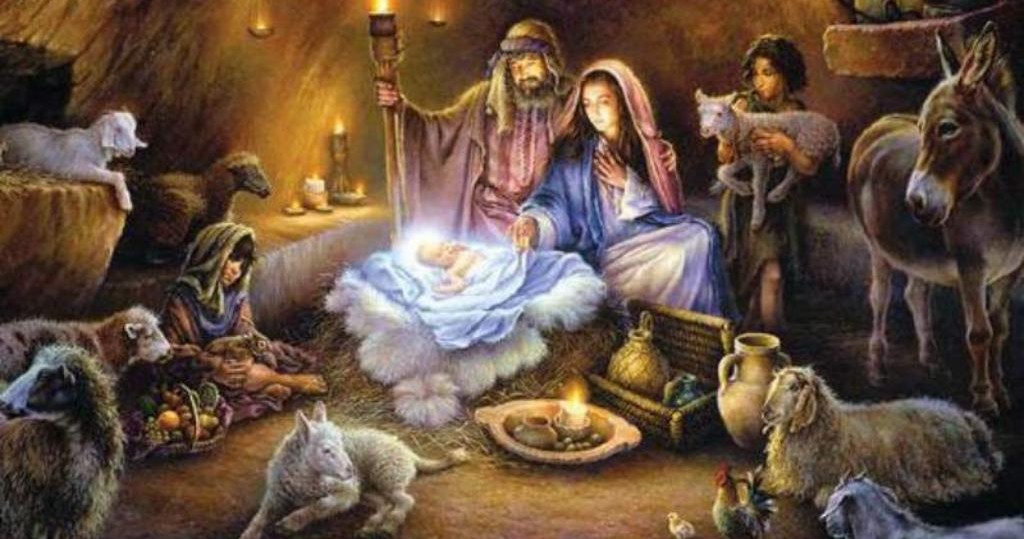

Luke’s account of Christ’s birth doesn’t mention the presence of animals. It just says that Mary “placed Him in a manger, because there was no room for them in the inn” (Luke 2 v 6). However, the fact that we are told the baby’s first crib was a feeding trough for animals, would suggest that Mary gave birth to Jesus in a type of cave or stable, where animals were kept. Bearing in mind we are told that the inn was full and, if we assume that Joseph had a donkey, it would seem unlikely that the stable would be empty. Whether or not that is so, Christian artwork frequently puts cows and donkeys alongside the Holy Family in the stable.
It does seem entirely appropriate to see the animals sharing mankind’s homage to a common creator. Not only is the humility of Jesus emphasised by the lowly company He kept during His first hours, but the Incarnation itself is highlighted by the indication that the flesh that Christ took on, the appetites and desires by which He limited Himself, are all shared by the animals. That Jesus should be born in a stable was indeed fitting. Our creation is something we always knew we shared with the animals, but as God chose to come as a human baby, not in a palace but in a stable, can it mean that our redemption is another experience shared by the animals?
When we call animals domesticated, we mean that they have learnt to be at home with us, and here, in the stable scene, we see some animals making themselves at home with God. This could be said to symbolise one of the purposes of the Incarnation, which was that God should reduce Himself in such a way that He could be accepted and loved by us. God made His home with us, making Himself knowable and lovable, so that we could be at home with Him. The Old Testament gives us the majesty and sovereignty of God, but even Isaiah appeared to be yearning for something more when he said, “O that you would rend the heavens and come down!. . . come down to make your name known” (Isaiah 64 v 1-2).
This describes what happened at the Incarnation when God made His home amongst us. It was thought in earlier times that if a man saw God he would die, yet here in the stable, not only do humans look lovingly on God in the form of a baby, but even animals are not afraid to look on, sharing in the universal Peace which is said to have descended on the earth with Christ. “All flesh will see the salvation of God” (Luke 3 v 6). The fact that animals seem to be in place on this occasion, as they would not normally be at a royal visit, brings out the significance of the Incarnation, whereby God added to His transcendence an intimacy which is at the very heart of the Christian faith and is shared by no other faith.
The best interpretation of the word ‘dominion’ of Genesis 1 and Psalm 8, as a description of our relationship to the animals is probably ‘guardianship’ or ‘protective care’. This relationship has been forgotten when we consider how animals are treated today in systems such as factory farming, vivisection, bloodsports, fur/skin trading etc.; where animals and things have changed places; where money and power are held to be more important than animals. It’s possible these disastrous displacements could be due to an even more serious displacement, whereby mankind has claimed supremacy over God. Here, Genesis finds the beginning of all our troubles and this is one of the fundamental truths of Genesis which doesn’t date.
The presence of the animals at the birth of Jesus is appropriate partly because it implies that their presence would not only be acceptable, but also cherished, by Him. Scripture tells us that the love here embodied in the Christ child is the same love that brought the whole of creation into being: “By Him all things were created” (John 1 v 3; Colossians1 v 16); and when He came into a stable “He came unto His own” (John 1 v 11). From this lovely scene, we learn that we too must cherish His creation and, when mankind offers his companionship to animals and delights in theirs that is surely what our common Creator would want.
Thank you for reading and following our blog! We hope you will ‘like’ and ‘share’ it! Your comments are always welcome! ~Ros

